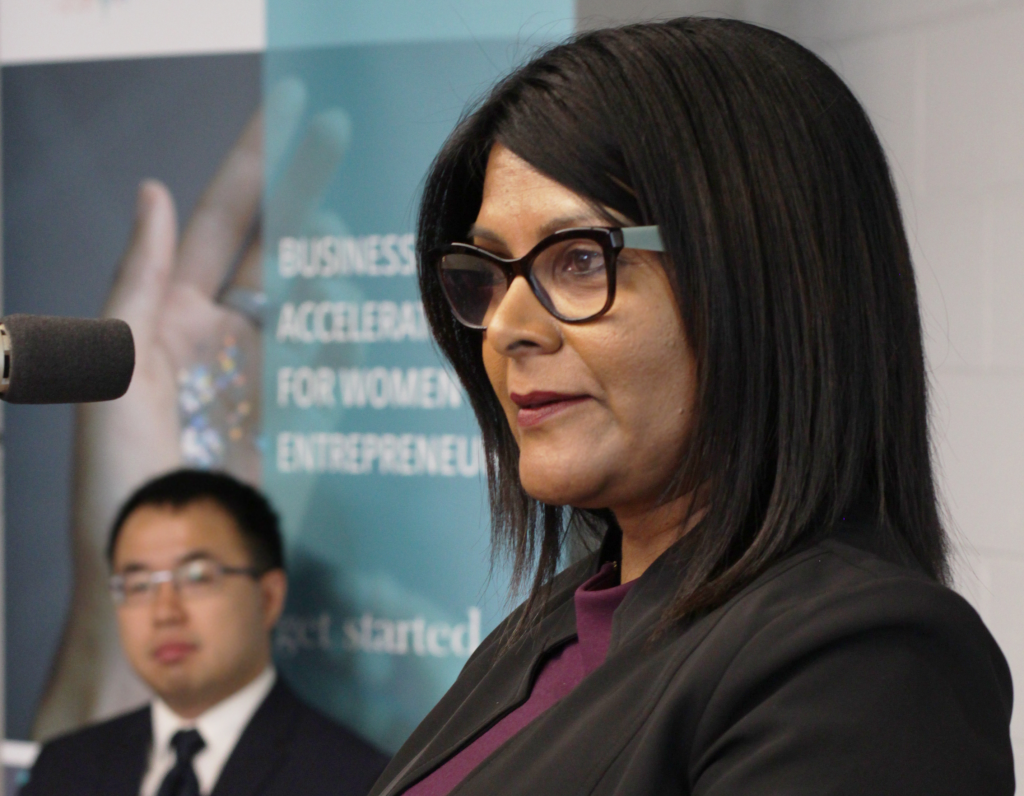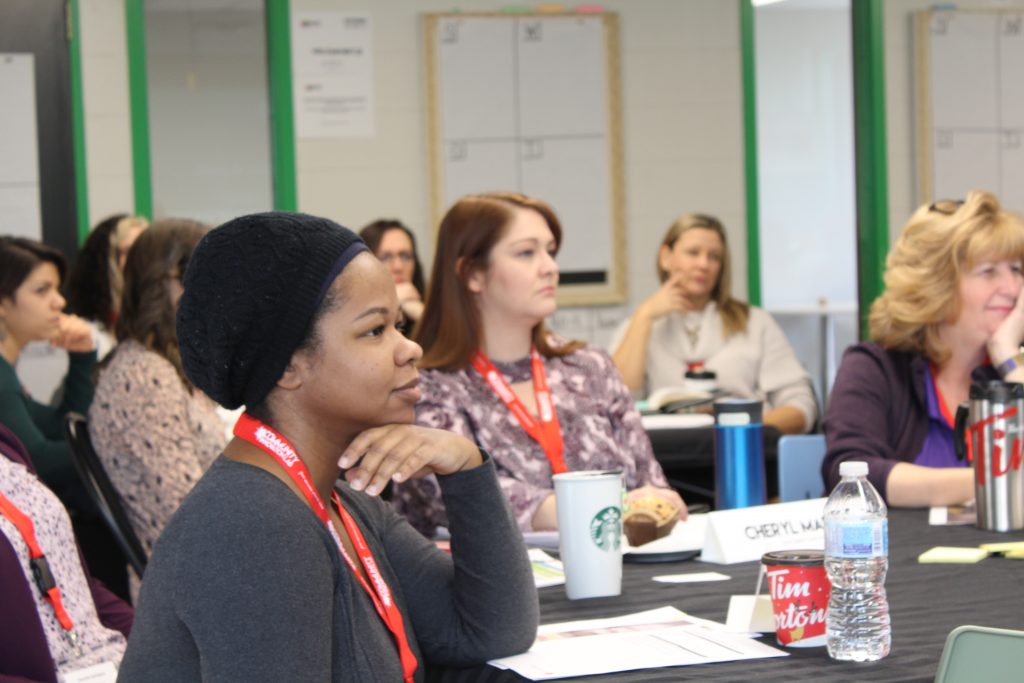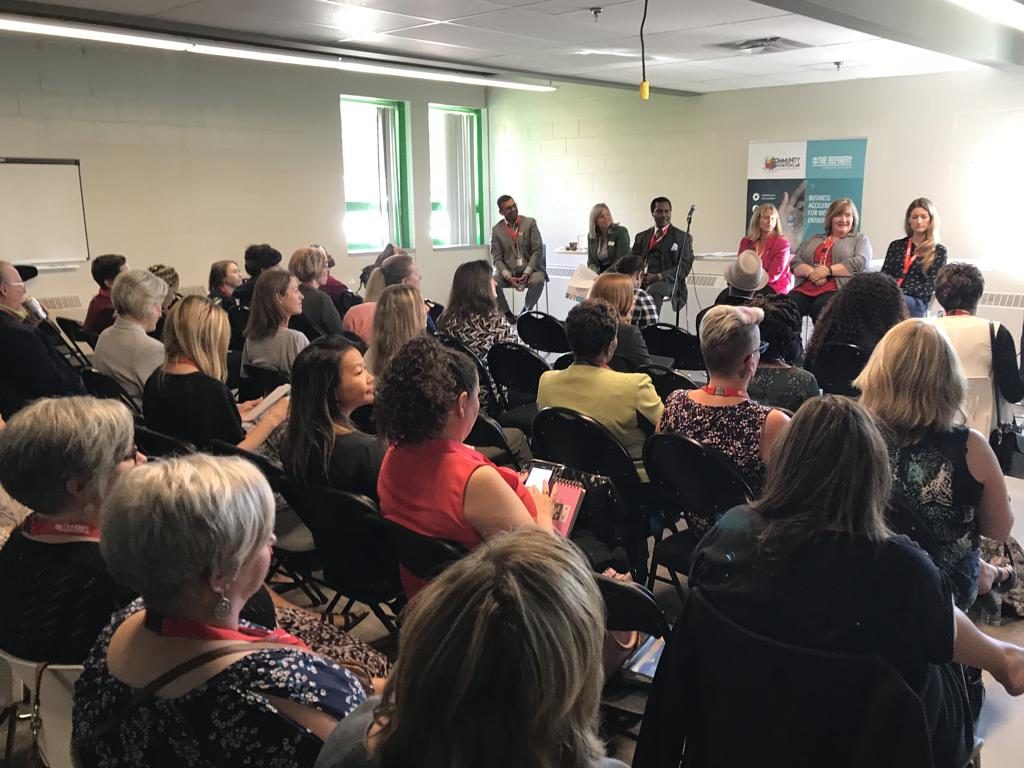
Athelstan Spilhaus Comic Strip, Illustrator: Gene Fawcett
PK’S VIEWPOINT
On a hot summer July evening, a few members of the LiisBeth team (Lana, Geraldine, Champagne) and I went to see a screening of The Experimental City, a 2017 documentary about the Minnesota Experimental City (MXC) project.
The MXC was a 1960s technology-led city-building project that sought to solve urban problems of the day (excessive waste, pollution, automobile congestion, lack of parks) by building a full-size Jetsons city on appropriated land from scratch, using the latest technology sourced from around the world.
Its lead visionary—engineer, futurist, comic strip author, and dean of the University of Minnesota’s Institute of Technology Athelstan Spilhaus—imagined a city with underground garbage recycling, lots of open parks, wilderness and farms, automatic highways, moving sidewalks, and waterless toilets. Fuelled by enthusiasm for the possibilities, a cadre of like-minded engineers, designers including geodesic dome inventor Buckminster Fuller, a newspaper publisher, futurists, politicians, and corporate leaders all decided take the techtopian idea from comic to concrete.
Despite years and significant spending on designs, plans, and site scouting, in the end the project never put a single shovel—or tree—in the ground.
We were interested in learning about the MXC because we are in the midst of planning our September 29 Feminist City Walk and Talk, an event dedicated to examining feminist approaches to city building.
Turns out watching the film was time well spent on several levels. The MXC story is not only a cautionary tale about techtopian projects in general. It is also a story about the limitations of patriarchal leadership styles.
When Product Trumps Process
The MXC plan was envisioned as an innovation experiment. Its unproven ideas girded by emerging technologies required a 60,000-square-foot sandbox and 250,000 real people living its experience in order to try things out, iterate, and try again until market-ready scale-up versions could be implemented elsewhere—for a handsome sum.
MXC was, essentially, a minimum viable product. Its citizens (in this case) were early-stage adopters. The play? To create new jobs and wealth for Minnesota by selling the experiment’s spinoff products and intellectual property (IP) that would arise out of the project. Partners and advocates included federal and state governments, the University of Minnesota, and the 3M corporation. The project’s all-male leaders were able to raise $250,000 from the US federal government and $670,000 (equivalent to $8.4 million today) from businesses to invest in the project plan.
It all sounded exciting and promising. There was just one problem: where to put it.
Eventually the group found a site—an unincorporated township in rural Minnesota with fewer than 2,500 residents (back-to-landers and rural folk). The assumption was that these residents would be pushovers and would be thrilled to see 60,000 acres of their pristine natural environment turned into a city of the future for a quarter of a million dollars. The pitch? Think of the jobs! Think of the economic development! Think of what we could learn! Think of the economic potential! Think of the profits!
By now, this top-down sell story should start to sound familiar, especially if you have been following Toronto’s Sidewalk Labs‘ (this time the study cost $50 million) city-building project spearheaded by Alphabet (Google’s parent company).
As you know, Minnesota’s Experimental City was never built. They didn’t even get close. Why? As the documentary so clearly points out, its leaders and advocates prioritized product over process. They assumed a “trust us, we got this” and “father knows best” stance that was off-putting. Most importantly, they overlooked Mary Parker Follet’s 1920s feminist management wisdom by adopting a “power over” (exert authority) approach versus “power to” (develop agency and capacity to act in others) combined with “power with” (acting as expert heroes instead of initiators and sustainers of a collective process).
They also forgot Margaret Mead’s timeless lesson: “Never doubt that a small group of thoughtful, committed citizens can change the world; indeed, it’s the only thing that ever has.” This applies not just to those with power and influence, but also to those with little else but just cause, a point of view, and determination.
And what if, as feminist management scholar CV Harquail suggests, we shifted the eye of these stormy projects from a focus on economic development to a focus on citizen care?
Today, 80 percent of North Americans and 55 percent of humanity worldwide live in cities. We need to embrace both product and process innovations to make cities livable, sustainable, and safe. However, a patriarchal, top-down, corporate sales–oriented process that puts technology and corporate interests first is unlikely to succeed.
Projects like these, which involve a complex and large set of inter-independent stakeholders, require a deep understanding of the role of power, agency, co-creation processes, and fair and equitable distribution of benefits. These are all things feminist leaders know a thing or two about.
Lana, Geraldine, Champagne and I stayed for the panel session that followed which featured accomplished tech entrepreneur and out spoken Sidewalk Labs critic Saadia Muzaffar, and Sidewalk Labs supporter, Ken Greenberg, the former Director of Urban Design and Architecture for the City Toronto, author of Toronto Reborn, and adviser to Sidewalk Labs Toronto.
Trying to keep an open mind, and putting aside the fireworks examples of mansplaining that occurred, the panel discussion only served to confirm our views.
Patriarchal leadership styles which, by the way, know no gender, is like kryptonite when it comes to complex, multi-stakeholder projects. Next time, we say we go lighter on the techno-determinists and engineers, and a little heavier on the feminist management scholars and leaders who are superstars at process.
WHAATT? TORONTO’S FIRST-EVER FEMINIST CITY WALK & TALK?! HOLD THE DATE!
Feminism has shifted mindsets about gender roles and made us more aware of the role that power and force of systems play in shaping our lives. But what role has feminism and feminists played in shaping our cities? Would would a feminist city look like? How would decisions and policies be made if feminist values and practices were incorporated? What would the Scotiabank Arena look like if it were designed by a feminist architect?
These are just some of the themes that will be explored during the Feminist City Walk & Talk coming up in Toronto on September 29 from 2:00PM to 5:30PM. Join Denise Pinto, expert guests, LiisBeth, and Jane’s Walk TO for this unique walk and talk on current feminist issues, city building, and alternative futures while exploring and learning about key sites where feminist history was made in Toronto.
THIS WEEK ON LIISBETH

Meet Victoria Claflin Woodhull, ca. 1866-1873, who was a feminist, serial entrepreneur, and US presidential candidate.
FIRST WOMAN TO RUN FOR PREZ
Was Hillary Clinton the first woman in the US to run for president? Nope.
That title belongs to badass suffragette leader Victoria Claflin Woodhull Martin (1838-1927). Woodhull was a serial entrepreneur, newspaper editor, Wall Street stock trader, public speaker, women’s rights reformer, and fortune teller. She had three husbands, two children (one of whom was disabled), and her feminism advocated for free love and socialism.
What can feminist entrepreneurs and aspiring women-identified politicians learn from Woodhull? Turns out, a lot.
This month on LiisBeth, check out new contributor Stephanie Newman’s truly fascinating piece on Woodhull from an entrepreneur’s perspective.
RISKY BUSINESS
Pramilla Ramdahani, Founder and CEO of Community Innovation Lab
Most startups don’t start off as high-growth enterprises. Growth is one goal, sure, but all businesses start from the bottom up. But bottom is a relative term. For abuse survivors and marginalized women, starting a business could mean working from a place of residual mental and physical effects of trauma, fear of publicity, possible ongoing threats, and little financial backing. But survivors also possess the much-needed entrepreneurial attributes of resilience, strength, and perseverance.
By 2020, 1,335 women, youth, senior entrepreneurs, and social entrepreneurs will have benefitted from initiatives at the Community Innovation Lab (Co-iLab).
What’s the Co-iLab difference? Participants are involved in the programming and design of the space. #cocreation
Michelle Davies spoke to Co-iLab’s founder Pramilla Ramdahani and reveals how Co-iLab is much more than an all-female accelerator. To get involved, or see if you’re a fit for The Refinery entrepreneurial program, check out the full story here.
EVERYTHING YOU WANTED TO KNOW ABOUT FEMINISM AND BUSINESS BUT WERE AFRAID TO ASK
CV Harquail’s new book, Feminism: A Key Idea for Business and Society, will get you to think differently about feminism’s relevance in business. But don’t just take our word for it—check out this review by Deloitte Professor in the Management of Growth Enterprises Dr. Barbara Orser. Orser has published over 100 academic and trade journals and knows the feminist entrepreneur space like a lioness knows the realities of the Savannah. She agrees it’s about time we have a book that succinctly explains why enterprises should be turning to feminist values and wisdom to transform business.
Read Orser’s review of the book here.
FEMINIST FREEBIE!
Be the first to comment (substantively) on Orser’s review of Feminism: A Key Idea for Business and Society and receive a gratitude copy.

NEW SUPPORTS FOR WOMEN-LED SOCIAL ENTERPRISES IN ONTARIO
Good news for women social entrepreneurs in Ontario! A new, unique program that will help diverse women-led social enterprises grow is set to launch in 2020. Read about the $3.6 million Canadian federal government announcement here.
The program endeavours to integrate Indigenous wisdom in its curriculum and approach. This is a first.
LIISBETH FIELD NOTES
MEET LIISBETH’S TWO INCREDIBLE NEW ADVISORY BOARD MEMBERS:
GERALDINE CAHILL & ANITA LI
Geraldine Cahill, LiisBeth Advisory Board Member 2019
We are delighted that Geraldine Cahill has joined the Liisbeth Advisory Board! Cahill is the Director of UpSocial Canada, a social innovation agency first launched in Barcelona in 2010. She is also the co-author of Social Innovation Generation: Fostering a Canadian Ecosystem for Systems Change and chair of the Jane’s Walk Steering Committee, an annual global festival celebrating local knowledge and community connection.
Born in Australia, Cahill completed a BA in Media Studies at RMIT University and a BA in Film and Television from the Victorian College of the Arts. Her first media love was radio; she produced current affairs and women’s sports programs over several years at 3CR before moving to Canada and supporting the launch of a non-profit online news site, The Real News Network.
We are also thrilled to announce that Anita Li, consultant and former director of communities at The Discourse, has also joined our Advisory Board!

Anita Li, LiisBeth Advisory Board Member 2019
Li is also editor-in-chief of The Other Wave, a website dedicated to covering media from a multicultural perspective. Prior to that, Li served as senior editor at Fusion and as news director at Complex. She’s also held reporting and editing positions at media outlets across North America, including Mashable, Toronto Star, The Globe and Mail, CBC, and CTV.
OUR AUGUST PLAYLIST: BOLD, BRAVE, UNAPOLOGETIC
Looking to discover feminist-leaning, female, trans, or queer-led bands? Not easy right? Turns out we see very little diversity represented on stages at live music venues. With initiatives like Gender Parity on Stage by Canadian Women Working in Music calling for music bookers to book 50 percent women-fronted bands, things may start to change for all women-identified genders that are under-represented on stage.
To help spotlight feminist bands, LiisBeth publishes playlists featuring tightly curated women-identified-led bands and singer/songwriters and songs that are blatantly about love, justice, and power.
Our latest August 2019 playlist serves up 10 songs by artists featured at this year’s Venus Fest, a feminist music festival created by Aerin Fogel that’s designed to showcase women-led, queer, and trans bands in Toronto.
FEMINIST FREEBIE!
Get your groove on and tell us what you think by commenting on the playlist here. First two people to leave a reply win two passes ($110 value) to Venus Fest in Toronto this September. #hellavalue
Photo Credit: Katherine Fung/The World
What is the definition of an enterprise?
According to the dictionary:
1. A project or undertaking that is especially difficult, complicated, or risky
2. Unit of economic organization or activity especially: a business organization
3. A systematic purposeful activity, i.e. digital media production is the main economic enterprise for visual artists
4. Or readiness to engage in daring or difficult action; showing initiative; being enterprising
What is a feminist enterprise?
All of the above along with express operational focus or mission related to social and gender justice.
So what is the feminist enterprise commons (FEC)?
A new online community where feminist entrepreneurs and changemakers who are building organizations, enterprises, or working on projects from around the globe can meet, share stories, tools, learnings, stress test new ideas, practices, source goods and services from each other, and above all, feel supported.
Why are we building it?
Elize Shirdel, feminist tech entrepreneur and long-time LiisBeth supporter, explains: “Feminism’s deep body of academic and grassroots work related to change-making and practice is an under-explored source of innovative ideas for founders and business leaders looking to truly advance social and gender justice. It’s great to finally have a place dedicated to exploring feminism in business plus learning about and sharing our experiences.”
The FEC will be a service provided to the LiisBeth community on a paid subscription basis. Stay tuned for more information in the next few weeks.
FEMINIST FREEBIE!
If you are on our list as a $10 monthly paying subscriber to LiisBeth by September 2019, you will be invited to receive a complimentary first three months!

Champagne Thomson (bottom left) and crew outside the public library in Peterborough, Ont., are bringing attention to the need for a new homeless shelter in their city.
IS HOMELESSNESS A FEMINIST ISSUE?
We think so. And it is not just a big-city issue either.
In a community of 78,777 where the housing vacancy rate is less than one percent, the rural city of Peterborough, Ont., struggles with establishing and funding shelters for those in need. Due to funding and location issues, the city recently closed its only barrier-free shelter on July 1, 2019. A temporary tent city was created to deal with the immediate need: a stop gap measure that is not ideal.
Few realize that women make up 50.1 percent of the under 16 homeless population in Canada, and 27.3 percent of the homeless population in Canada overall). These figures do not include women and women-identified people who experience temporary homelessness as a result of domestic violence.
Any entrepreneurial solutions to funding safe, barrier-free physical shelters out there? Let us know (email [email protected]). We would love to hear and write about them.
LIISBETH MAKES FEEDSPOT’S TOP 10 FEMINIST MAGAZINE LIST

Play the video below to hear the sound of LiisBeth tooting our horn because we were voted as one of the Top 10 Feminist Magazines, Publications & Ezines To Follow In 2019 by Feedspot, an online RSS feed reader.
The Best Feminist Magazines are chosen from thousands of feminist magazines on the web using search and social metrics. Readers subscribe to these websites because they are actively working to educate, inspire, and empower themselves with frequent updates and high-quality information. Data will be refreshed once a week.

***
If social and economic justice are important to you.
Help us SUPPORT, BUILD & GROW the feminist economy
We do this for YOU
Our readers, our community, our future.Every paid subscription helps us with grant applications, paying new contributors, and bringing these newsletters to your inbox.
We can’t do it without you.
Each online magazine refresh and newsletter takes a collective effort.
We have reached over 2,800 subscribers.
Less than 30 percent contribute financially.

“Rising high up on the heather-covered moorlands, seeping through our bogs, flowing down our streams and into our rivers and out onto the sandy strands of the rock-strewn Atlantic seaboard, are the old Celtic myths and stories…waiting to be reclaimed and re-visioned for the modern world.”
Aged 30, Sharon Blackie found herself weeping in the car park of the multinational corporation where she worked, wondering if this was what a nervous breakdown felt like. Somewhere along the line, she realized, she had lost herself—and so began her long journey back to authenticity, rootedness in place and belonging.
In this extraordinary book of myth, memoir, and modern-day mentors (from fashion designers to lawyers), Blackie faces the wasteland of Western culture, the repression of women, and the devastation of our planet. She boldly names the challenge: to reimagine women’s place in the world, and to rise up, firmly rooted in our own native landscapes and the powerful Celtic stories and wisdom which sprang from them.
“A haunting heroine’s journey for every woman who finds inspiration and solace in the natural world.” —Goodreads.com
“I love this book. Truly, it’s mind-blowing in the most profound and exhilarating sense. This is an anthem for all we could be, an essential book for this, the most critical of recent times. I sincerely hope every woman who can read is given one, and has the time and the space to read it.” –Manda Scott, author of Boudica and Into the Fire

Forbidden Fruit: Engaging an Indigenous Feminist Lens as an Neninaw Iskwew is a feminist-based memoir acknowledging that people are measured, categorized, and placed in a hierarchal order that is deeply influenced by discourses predicated upon social processes.
“Dr. McKay’s Indigenous feminism is about being aware that due to the colonial patriarchy that has seeped through Indigenous social and cultural systems, Indigenous women are positioned differently in economic, social, and political structures. Marlene masterfully uses her own life experiences to assert that colonialism and Indigenous cultures obscure the role of women in a way that continues both their marginalization and the binary of the princess/squaw.” —J Charlton Publishing
Marlene E. Mckay entered the teaching profession after working as a social worker/counsellor for about 15 years. She has four earned university degrees. Marlene’s education focuses on Indigenous feminism, social justice, anti-racist education, and as a Cree speaker herself, she has a deep commitment to Indigenous literacy. Her research is motivated by observing and experiencing marginalization. Dr. McKay asserts that subjugation is influenced by identity categories of race, class status, and gender. She further argues that one’s speech is used to categorize people. Dr. McKay has taught at the University of Saskatchewan and the University of Alberta.
AND FINALLY . . . IN CASE YOU MISSED IT!
- Not all equal voice call-outs are created equal. This National Observer piece highlights the stories of three women who were fired after raising concerns about racism in the women advocacy organization.
- Social procurement strategies can build inclusive local economies. Thinking about creating one? Check out this useful article here (written by PK Mutch and published in Local Love).
- Entrepreneurs can’t do it all. And we don’t do it alone. Incubators and accelerators are places where business startups meet, network, find funding opportunities and mentors, and more. Here are Startup Funding’s list of Top 31 Accelerators for women located in the US and abroad.
- Here is an opportunity for #womenintech in Toronto that we wanted to share. Toronto Tech Study aims to get a clear-headed read on the state of sexual harassment in the sector. Yes, it still happens. But how pervasive is it? You have to see the gap before you can figure out how to move past it. The Aperta Project is intended to help Toronto build a more inclusive tech sector in the #MeToo era. Do you have a story about sexual harassment in Toronto tech? Share your experience anonymously to this project and learn more here.
- Alberta hair salons are levelling the playing field by charging the same price for haircuts no matter the client’s gender. Check out this article that includes a seven-minute interview with Jennifer Storey, the owner of Adara Hair in Edmonton, who explains why her salon decided to become the first place in Edmonton to advertise gender-neutral pricing.
- Listen to an episode of LiisBeth’s favourite podcast, On Being, here. In this episode, host Krista Tippett chats with philosopher Jonathan Rowson, co-founder of the research platform Perspectiva, who believes the world’s major challenges stem from a crisis of perception and imagination. The episode focuses on the connection between our inner and outer worlds and how social change happens across “systems, souls, and society.”
That’s it for our August newsletter! Hate to drop the F-bomb, but fall will soon be here.
We will be back September 23 with more profiles and stories that may bring you joy or make you want to kick the ground!
If you do not currently support LiisBeth, we hope you will consider doing so. There are less than four feminist publications in Canada. We are the ONLY intersectional feminist publication in the world dedicated entirely to examining entrepreneurship and innovation via a feminist lens. We are one of only a few sources of income for feminist writers, academics, and grassroots thought leaders.
Also, remember, if you have a story tip, email us a [email protected]. We are currently accepting queries for December.
Enjoy the last few weeks of summer (or winter depending on where you live).
Blue skies either way,






























 Joyful Militancy
Joyful Militancy

